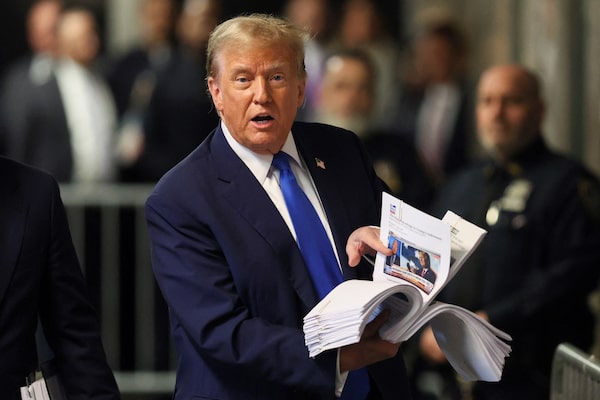
Former U.S. president Donald Trump holds press clippings as he speaks to the press at the conclusion of the third day of his trial for allegedly covering up hush money payments linked to extramarital affairs at Manhattan Criminal Court in New York on April 18.BRENDAN MCDERMID/Getty Images
A Manhattan court has finished picking the jury for Donald Trump’s criminal hush-money trial amid growing fears for the safety and anonymity of the people asked to decide the former president’s fate.
Prosecutors, meanwhile, complained that Mr. Trump again violated a gag order meant to stop him from intimidating witnesses and judicial officials despite a warning over his conduct earlier this week.
By the end of proceedings on Thursday, the court had empanelled a jury of seven men and five women. The group skewed toward white-collar professionals, with at least two lawyers, two computer engineers, a banker and a clothing designer among those chosen.
Court also picked one alternate juror and will reconvene Friday to choose five more. Opening arguments in the case are scheduled for Monday. Judge Juan Merchan estimated the trial will last six weeks.
Thursday began with two jurors chosen days earlier being removed from the panel.
One juror, an oncology nurse, asked to be excused after she said her friends and co-workers had figured out that she was involved with the case and started asking her about it. “Aspects of my attending are already out there in public,” she said, adding that “outside influences” could affect her decision-making on the jury. Justice Merchan granted her request.
The names of the jurors are not public but they are shared with the prosecution and defence for the purpose of vetting them. They must also answer questions in open court that include specific identifying details, such as the names of their employers, small businesses they own, what neighbourhoods they live in and what their spouses do for work.
The prospect of being identified as a juror is particularly fraught in such a high-profile case, in which Mr. Trump has been repeatedly accused of encouraging his followers to harass the judge, prosecutors and witnesses.
Justice Merchan ordered reporters on Thursday not to publish physical descriptions of jurors or name their employers. “We just lost someone who could have been a good juror,” he said.
A second juror was dismissed after investigation by the prosecutor’s office found someone with his name had been arrested in suburban Westchester County in the 1990s for tearing down right-wing political posters. The juror had previously told court he had never been arrested.
A middle-aged IT consultant, he had also created a memorable moment on Tuesday when he dodged efforts by Mr. Trump’s lawyers to discover his political leanings by exuberantly saying his opinion of the former president was “Wow!”
Susan Necheles, a member of the Trump legal team, spent much of Thursday similarly trying to weed out anyone with a political dislike of her client. At one point, she confronted a prospective juror with Facebook posts from 2016 that described Mr. Trump as a “racist, sexist, narcissist.”
“Oops. That sounds bad,” the woman replied. Justice Merchan granted Ms. Necheles’s request to disqualify the prospect.
The woman was among several potential jurors who admitted to disagreeing with Mr. Trump politically but said this would not stop them from dealing with the case impartially. In most instances, Justice Merchan accepted such explanations.
When Ms. Necheles tried to exclude a woman who described Mr. Trump as “very selfish and self-serving,” Mr. Merchan turned down the request. “It’s not about whether she likes Trump,” he said. The former president’s legal team used one of their 10 strikes to exclude the woman from the panel.
Prosecutors, meanwhile, deployed strikes to eliminate prospective jurors who fit the profile of conservative voters. One of these was a state court police officer and hockey fan who praised Mr. Trump for once rehabilitating a public ice rink in the city. Another was a man who professed himself “in awe” of the work of police and said he had read Trump: The Art of the Deal.
Assistant District Attorney Chris Conroy, meanwhile, pressed again for Mr. Trump to be held in contempt of court for flouting Justice Merchan’s gag order. The judge had already scheduled a hearing for next week on previous complaints about Mr. Trump disobeying the order. Since then, Mr. Conroy pointed out, Mr. Trump had made at least seven different comments attacking the judge, witnesses or prospective jurors.
In posts to his Truth Social platform, Mr. Trump referred to Michael Cohen, his former lawyer who arranged the hush-money payment and will testify for the prosecution, as a “serial perjurer.” In another post, he speculated that “undercover liberal activists” were trying to get onto the jury. Justice Merchan said he would add these complaints to the already-scheduled hearing.
Near the end of the day, Todd Blanche, Mr. Trump’s lead barrister, asked if prosecutors could give him the list of the first three witnesses they intended to call. Assistant District Attorney Joshua Steinglass refused because of Mr. Trump’s repeated attacks on witnesses.
When Mr. Blanche offered to “commit to the court” that Mr. Trump would not post to Truth Social about any of the witnesses, Justice Merchan replied bluntly: “I don’t think you can make that representation.”